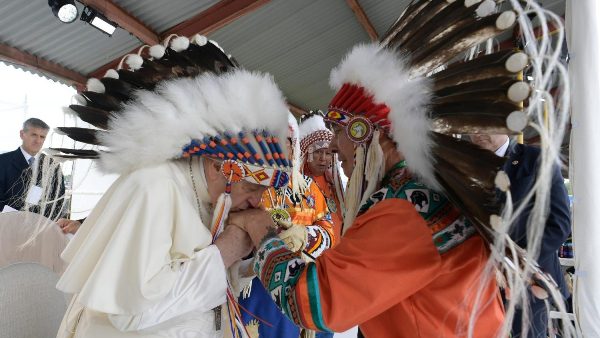Church in Canada desires reconciliation with indigenous to become ‘lived reality’
 Reflecting on the second anniversary of Pope Francis’ penitential journey to Canada in 2022, the President of the Canadian Conference of Catholic Bishops says he hopes the concrete actions being taken by the Church can help make truth and reconciliation with Indigenous peoples a ‘lived reality.’
Reflecting on the second anniversary of Pope Francis’ penitential journey to Canada in 2022, the President of the Canadian Conference of Catholic Bishops says he hopes the concrete actions being taken by the Church can help make truth and reconciliation with Indigenous peoples a ‘lived reality.’
Pope Francis’s penitential journey to Canada in 2022 “was the beginning of what the bishops had hoped for” and “a meaningful step on this journey of reconciliation with our Indigenous peoples,” says Bishop William McGrattan of Calgary, the current President of the Canadian Conference of Catholic Bishops (CCCB).
Speaking with Vatican Radio on the anniversary of the Pope’s visit, Bishop McGrattan highlighted some of the concrete initiatives undertaken by the Church in Canada in the past two years, including the creation of a 30 million dollar fund for projects of healing and reconciliation; facilitation of transparent access to Church records; and continuing efforts of dialogue and listening.
Initial steps
The bishops are also engaged in conversations aimed at promoting a deeper understanding of the so-called “Doctrine of Discovery”, which focus on examining the concept from an historical and an educational perspective.
In addition, the bishops have recently begun discussions concerning indigenous concerns about artifacts held by the Vatican Museums, including looking at the possibility of working with the Canadian government to investigate the possibility of returning some of those holdings.
“These are initial steps,” Bishop McGrattan explained, with some being in very preliminary stages. Nonetheless, the Bishop said, “we’re hopeful they will bear some fruit in the future.”
Current challenges
Bishop McGrattan noted, too, that efforts to support Indigenous projects through the Indigenous Reconciliation Fund have helped to raise awareness not only of the past, but also of current issues facing Canada’s indigenous communities, including health care and access to social services.
“So I think for us, we're beginning to see that the legacy of residential schools and even some of the government policies have created a marginalization that maybe most of our Canadians and Catholics aren't necessarily aware of,” Bishop McGrattan said. “And I think this is a first step to becoming more conscious, more aware, and educating ourselves on the devastation” caused by that legacy.
A lived reality
The President of the Canadian Bishops’ Conference said that seeing some of the fruits of the Indigenous Reconciliation Committee, which identifies projects to be supported by the Fund, can help Catholics become more aware of how their contributions support the work of elders and other indigenous peoples for their communities. “I think it helps them to know that there is this step of reconciliation and seeking the truth which is concrete, and that they are participating in a meaningful way,” he said.
Finally, recalling Pope Francis’s continued emphasis on the importance of memory in shaping a people and a culture, Bishop McGrattan acknowledged the “negative impact” of the residential school system. However, he added, “hopefully the steps we’re taking now can begin in some way to redress that, and to allow for truth… and reconciliation to be a truly lived reality here in Canada with our indigenous communities.”
Christopher Wells
Source: vaticannews.va/en
